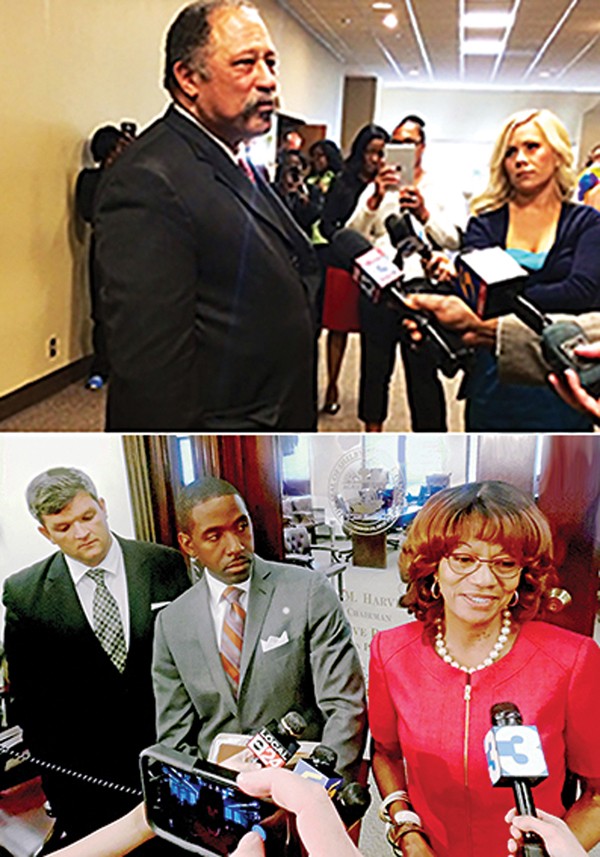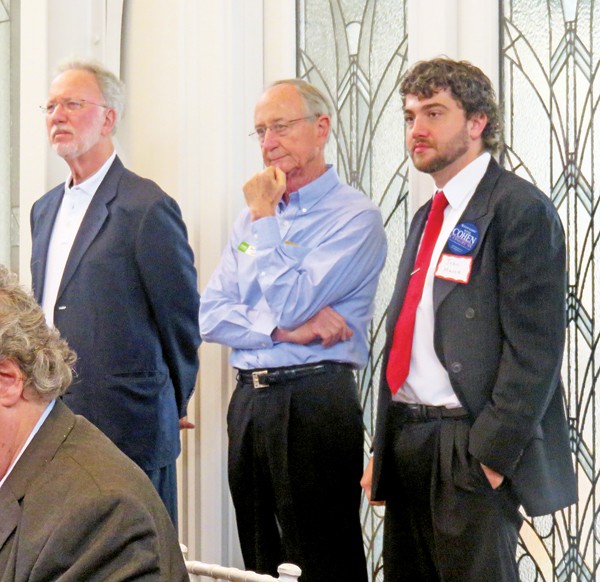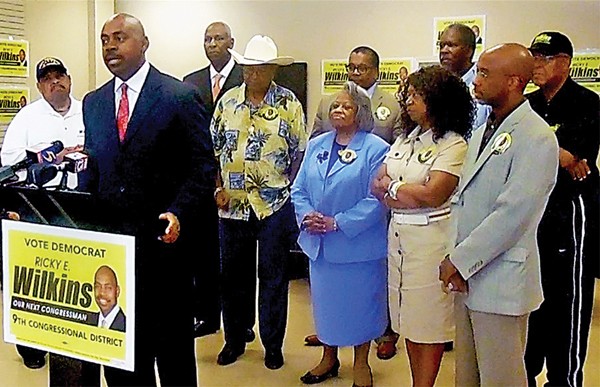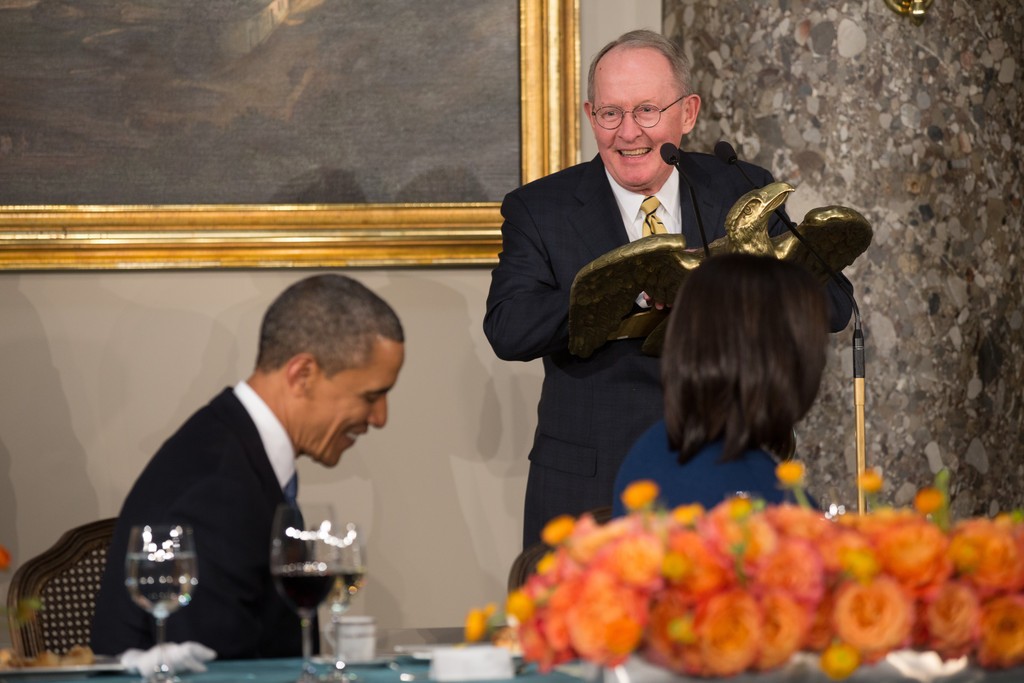The mid-summer election cycle of 2014 began July 18th, with a stronger than usual turnout for an early voting period that will last through Saturday, August 2nd.
When the final votes are tallied late on the evening of election day, August 7th, several factors will no doubt have affected the outcome — ranging from dissension among Democratic activists regarding party endorsements for judicial candidates to controversies surrounding key campaigns to candidate matchups that will either settle old scores or create new ones.
It is no accident that ferment among Democrats is a key factor in what happens in the run-up to August 7th and beyond. The Democratic Party began the campaign year with something to prove.
In 2010, all Democratic candidates for county office were defeated by their GOP counterparts, and the scope of that defeat, in the face of what had seemed a formidable demographic edge for the Democrats in a majority African-American county, occasioned a reaction among local party cadres that was equal parts chagrin, disbelief, suspicion of being cheated, and a resolve not to let it happen again.
But Shelby County’s Democrats, who in theory should have a more pronounced demographic advantage than even four years ago, are in fact threatened with the prospect of another Republican sweep. This is due more to a series of Democratic misadventures than to any artfulness on the part of the Republicans, though the GOP’s substantial edge in financial resources is a factor to be reckoned with, as well.
As one indication of just how wide that gulf is, Mark Luttrell, the Republican incumbent in the race for county mayor, arguably the premier race on this year’s county ballot, ended the second quarter of 2014 — and began the stretch drive of his campaign — with a balance on hand of $132,417, while his Democratic opponent, former County Commissioner Deidre Malone, by contrast, could boast of only $38,914.
And even those figures did not hint at the actual disproportion. During the second quarter of 2014, from April 1st through June 30th, Malone had spent $25,172, while Luttrell had put in play the whopping amount of $290, 210 — money which, among other things, paid for a series of seemingly nonstop TV ads featuring the telegenic incumbent. Meanwhile Malone was largely dependent on free media, which was hard to come by.
Similar discrepancies exist among the parties in other county races that occupy a relatively small but crucial portion of a long ballot that also includes state and federal primary races and school board elections.
Here’s a preview of some of the key races. Others are in the article “No ‘Down Ballot’ in Shelby County This Year” in this week’s “Political Beat”.
 Lauren Rae Holtermann
Lauren Rae Holtermann
Deidre Malone Vs Mayor Mark Luttrell
COUNTY MAYOR — Not only does the GOP’s Luttrell have the advantages of incumbency and funding, he has a public persona that is likable enough that even opponent Malone has been forced to acknowledge that “Mark is a nice guy.”
She has a case to make that Luttrell has been indifferent or worse in matters ranging from Head Start, from which he extricated county government, or Title X funding for women’s services, where he acted to defund Planned Parenthood, or that he is overcautious in general. But such matters are hard to dramatize to a general public. Meanwhile, Luttrell is adept in seeking compromise, which he did this week in agreeing with Democrats to establish a county pre-K program.
Clear advantage to Luttrell.
SHERIFF — Bill Oldham, the GOP incumbent, has attracted no criticism to speak of in his workman-like first four years, and it is hard to see how deputy Bennie Cobb, the Democratic nominee, who, like other Democrats, has had limited exposure, can draw the contrast he needs to interest swing voters in making a change.
Advantage to Oldham.
 Lauren Rae Holtermann
Lauren Rae Holtermann
D.A. Amy Weirich Vs Judge Joe Brown
DISTRICT ATTORNEY GENERAL — At the beginning of the campaign year, D.A. Amy Weirich, a surprisingly easy victor over underrated Democrat Carol Chumney four years ago, was anything but a household word, and was potentially vulnerable to an adroit campaign by former Criminal Court Judge Joe Brown, a bona fide celebrity from 15 years as TV’s “Judge Joe Brown” and the possessor of democratic (small ‘d’) instincts and a real, if fitful, craftiness.
But Brown also possesses an impulse to implode, something he had telegraphed via some rash statements in pre-campaign public appearances.
An early tangle in Juvenile Court, which earned him a contempt citation, may actually have benefited Brown, who assumed the role of a champion of the downtrodden. But his recent intimation that his opponent was a lesbian, an adulteress, and an exploiter, utterly without evidence, and sticking to it, was the kind of mistake it’s hard to recover from, though Brown has made strenuous efforts since — seeking to conciliate (and even champion) the LGBT constituency.
(For comparison, though, here was Brown ad-libbing at large last fall at a Democratic Party “roast” of former Mayor Willie Herenton: “I’m damned if I’m going to get all worked up about this stuff coming out of San Francisco, when gay rights are more important than people having employment rights!”)
Weirich, meanwhile, has raised ample money to publicize her image as a public-safety pro, even if detractors see her as an overzealous prosecutor more interested in winning cases than seeking justice. That, indeed, is where her own version of I-make-no-apology comes in.
 Jackson Baker
Jackson Baker
Brown (top) and Brooks (bottom) found themselves immersed in controversy, to the detriment of their campaigns and the Democratic ticket.
Judge Joe, the wannabe party “boss” (a boast of his from early in the campaign) still has an undefinable amount of grass-roots appeal in the inner city, but, tied up apparently by his ongoing divorce, the money Brown was going to bankroll the party ticket with never showed, and his GOTV efforts may be working more for the other side at this point.
Weirich.
JUVENILE COURT CLERK — This is the other race where a Democratic Party advantage seems to have morphed into its opposite. Outgoing County Commissioner Henri Brooks began the campaign year as the recipient of public honors. By her steadfast persistence she had, virtually single-handedly, forced the U.S. Department of Justice to mandate overdue reforms at Juvenile Court (though, in fairness to outgoing Juvenile Court Judge Curtis Person, some of these may already have been underway).
Brooks not only had Ruby Wharton, wife of the city’s mayor, as her campaign chair, she was the winner of the Ruby R. Wharton Award for her court-reform efforts. Essentially, all she had to do to coast to victory over the low-profile Republican incumbent, Joy Touliatos, was to make nice and exercise a modest amount of outreach to constituencies other than the African-American one she claimed as her own.
Somewhat famously, she didn’t. Within a two-month span, Brooks overplayed her hand at a commission meeting, publicly brow-beating a Hispanic witness and insulting two of her colleagues; then got herself charged with misdemeanor assault and lost her Methodist Hospital job after witnesses described her as the aggressor in an altercation with another woman in the hospital parking lot; and finally was revealed not to be a resident of the district she served and had to fight off colleagues’ efforts to unseat her.
Meanwhile, Touliatos’ placid personality and stable service began to look better and better.
Advantage, Touliatos.
COUNTY TRUSTEE — Republican incumbent David Lenoir has generally impressed neutral onlookers as having done a good job and has raised oodles of campaign cash to boot. Democratic nominee Derrick Bennett has done little campaigning and has made minimal impact.
Advantage, Lenoir.
ASSESSOR OF PROPERTY — Even among Democratic pessimists, this is the one county office that still seems winnable. The party nominee, Cheyenne Johnson, is a respected and experienced incumbent who won reelection handily two years ago and was unkindly forced to do it all over again this year after a legislative act forced the assessor’s four-year term into the same cycle as other county offices.
Johnson is running a determined race and has abundant support, some of it crossover, but her relatively nondescript opponent, Republican Keith Alexander, can boast some basic credentials and hopes to ride the Republican ballot into an upset.
Still leaning Johnson.
CRIMINAL COURT CLERK — The illness of Republican incumbent Kevin Key elevated his major assistant, Richard DeSaussure, into his de facto replacement, and though City Councilwoman Wanda Halbert, the Democratic nominee, appears to be working hard and should not be underestimated, DeSaussure appears to have a firm hold on other GOP coattails.
Advantage, DeSaussure.
CIRCUIT COURT CLERK — Republican incumbent Jimmy Moore is well-connected across party lines, while his opponent, Democratic nominee Rhonda Banks, is a neophyte without any connections at all.
Moore, easily.
PROBATE COURT CLERK — Republican Paul Boyd, who has the distinction of being his party’s ranking African-American official in county government, rode the GOP tide to an upset win four years ago and has worked hard to build his public image, even to the point of turning up at Democratic Party events this year. (“I just want them to know I’m their clerk, too,” he explained.)
Meanwhile, Democratic nominee William Chism may have won his primary mainly on the strength of having the same last name as outgoing County Commissioner Sidney Chism, a well-known party presence but no relation. He remains someone most of his party mates could not pick out of a lineup.
Advantage, Boyd.
COUNTY CLERK — Republican incumbent Wayne Mashburn, son of longtime independent clerk Sonny Mashburn, carries the family mantle, while Democrat Charlotte Draper has to overcome her party’s doldrums and a reputation as a perennial candidate.
Advantage, Mashburn.
REGISTER OF DEEDS — GOP incumbent Tom Leatherwood, once a hot-blooded GOP state Senator, has long since rounded off his edges and settled into the role of an experienced and respected administrator. Democrat Coleman Thompson is likeable, but he, too, has become something of a perennial.
Advantage, Leatherwood.
If you’re keeping score, that’s a Republican lead in nine of the 10 offices on the countywide general ballot, with an outside chance of finishing 10 for 10. Going into the stretch, it would appear that the Democratic effort to recoup for the local party debacle of 2010 is doomed to fall short — and this despite an ever-widening African-American predominance in the county population as a whole, the demographic fact that was supposed to insure long-term Democratic superiority.
And there is the example of Boyd to suggest that Republicans, whose efforts at outreach to minorities have been on again, off again, have an opportunity to make real inroads if county government follows the lead of state government in establishing the GOP as the official party of choice.
THE SHELBY COUNTY
COMMISSION — The one aspect of county government where Democrats have an edge at present and can be expected to keep it is on the county’s 13-member legislative branch, currently containing seven Democrats and six Republicans.
The new commission that will take office in September is basically already formed and will likely have the same seven to six ratio. Democrats could fare even better in the future if current demographic trends continue, as seems likely. And the commission’s adoption of 13 single-member districts to replace the old system of large, multi-member districts should reinforce and enlarge their majority.
Here is the rundown on the 13 Commission seats on the ballot:
District 1 (North Shelby County): Incumbent Republican Terry Roland of Millington is unopposed for a second term.
District 2 (Collierville): Republican George Chism is unopposed.
District 3 (Bartlett): The GOP’s David Reaves, currently a member of the Shelby County Schools board, is unopposed.
District 4 (Germantown): Republican incumbent Mark Billingsley is opposed by a game Democrat, Jackie Jackson, but should prevail.
District 5: This East Memphis enclave is in theory contested by GOP incumbent Heidi Shafer and Democrat Taylor Berger, but Berger discontinued his campaign efforts months ago and Shafer will walk in.
District 6: Democrat Willie Brooks is highly favored over Republican David Shiffman in this Frayser-based terrain.
District 7: Democratic incumbent Melvin Burgess is unopposed.
District 8: Incumbent Democrat Walter Bailey, a lion of the commission, is highly favored over Republican Julie Ray.
District 9: Democrat Justin Ford has this South Memphis terrain to himself.
District 10: Democrat Reginald Milton has an able Republican newcomer, Geoff Diaz, to contend with, but the odds are well in his favor.
District 11: Democrat Eddie Jones, unopposed in this Whitehaven-based district, hits paydirt after several previous tries for public office.
District 12: Democrat Van Turner, the lawyer and former local Democratic chairman, is unopposed.
District 13: Republican incumbent Steve Basar would seem to be well ensconced in an East Memphis/suburban district with an ostensible Republican majority, but Democratic nominee Manoj Jain, a physician, is working hard, showing up everywhere, including Republican Party events, and has an outside chance of pulling off an upset.
Likely upshot: New commission, new faces, new directions, but the same old seven and six.
STATE AND FEDERAL OFFICES:
Governor: Republican incumbent Bill Haslam is slated for a slam-dunk win over several nominal candidates in the GOP primary and will be heavily favored in November over the victor in a nondescript Democratic primary field, likely to be former Sullivan County Commissioner John McKamey, an amiable yellow-dog Democrat who has visisted Memphis several times from his East Tennessee bailiwick.
U.S. Senator: Incumbent Republican Lamar Alexander started getting ready for a likely Tea Party challenge to his renomination two years ago, sewing up all the party endorsements that counted and most of the loose change that was available, too, amassing a campaign war chest that, as of now, stands at well above $3 million.
Often considered a moderate, Alexander has adjusted his rhetoric in a more conservative direction and remains a clear favorite over a large GOP primary field that includes only two opponents with even an outside chance to challenge his dominance.
One is Joe Carr, an eccentric right-wing state representative from Lascassas in Middle Tennessee who has some appreciable Tea Party support and has mustered campaign help from the likes of former Pennsylvania Senator and 2012 presidential candidate Rick Santorum and talk show host Laura Ingraham.
The other Alexander foe, perhaps a graver threat to Carr’s hopes than to Alexander’s, is deep-pocketed Memphis physician/businessman George Flinn, the former Shelby County commissioner and frequent candidate who began his race by focusing mainly on a health-care plan he offers as an alternative to the Affordable Care Act (aka Obamacare). But Flinn, like Carr, responded to the stunning defeat of GOP House majority leader Eric Cantor in Virginia and the near defeat of Mississippi Senator Thad Cochran and upped his ante with a $2 million dump of his own cash into a race that now features several TV ads aimed at Alexander.
There’s a race on the Democratic side as well, with the leading contenders being two Knoxville attorneys, Gordon Ball and Terry Adams, both of whom have made frequent stops in Memphis during an all-out statewide competition that hearkens back to the old days of the solid Democratic South, when victory in a Democratic primary was, in the phrase of the time, tantamount to election.
That is no longer the case, of course, but Ball and Adams sense an opportunity to make at least a respectable dent in Alexander’s totals or, if the unthinkable should happen and Carr should overcome the incumbent Senator on a Tea Party surge, to have a legitimate chance at victory.
Ball and Adams are both solid campaigners, and they represent the poles of current Democratic thought. Adams was first in last year, having been recruited by the state party establishment. He focuses on the issue of economic inequality and is a rousing speaker on the stump. Ball, a multi-millionaire from his legal victories (including several over large corporations), is capable of self-financing and blends support of Democratic social policies with centrist political positions like his advocacy of a flat tax.
Adams never fails to note that Ball has in the past supported Republican political figures like Haslam and Alexander. Ball responds that some degree of political cross-pollination has historically been necessary in East Tennessee but is willing to write off his past backing of GOP figures as mistakes.
9th District, House of Representatives: Though there are nominal races on both the Republican and Democratic sides in the 8th Congressional district, which juts significantly into eastern Shelby County, it is all but a given that incumbent GOP Congressman Stephen Fincher of Frog Jump in Crockett County will triumph in his primary and in November.

Cohen brain trust at a recent event. From left: strategist Jerry Austin, campaign treasurer Henry Turley, campaign manager John Marek
It is probable, too, that 9th District incumbent Democrat Steve Cohen will emerge the winner, as usual, in a Democratic primary where, also as usual, he faces an opponent — this year’s version being lawyer Ricky Wilkins. It is unlikely, however, that Cohen will prevail with the 4-to-1 margins he has grown accustomed to against such prior primary rivals as Nikki Tinker, former Mayor Willie Herenton, and Tomeka Hart.
Wilkins’ cash on hand as of the June 30th reporting period was $87,034, no match for Cohen’s total of $887,251, but the challenger is running what seems to be a credible grassroots campaign and was able to boast the backing of 21 current and former elected officials at a press conference last week, though Cohen’s campaign has secured statements of disavowal from two of those, City Councilmembers Janis Fullilove and Edmund Ford Jr., neither of whom attended Wilkins’ press conference.
Even Cohen supporters concede that this year’s race will be a closer affair, however, and current estimates by neutral observers are in the range of a 70 to 30 percent edge for Cohen, with the possibility that the gap could close tighter than that, which gives the current race the sense of a grudge match that could continue in future campaign years.
In seeming acknowledgement, Cohen has mocked his opponent’s billboard slogan, “Ricky Wilkins, Your Next Congressman,” with the jibe that Wilkins can use it “over and over and over.”
There are no great issues dividing the two candidates, though Wilkins has made much over what he says is Cohen’s disinclination to get involved in “local” matters, like the running school-merger controversy of the past few years, while Cohen responds that his job is to defer to local officials, not to dictate to them.
Cohen is running on what he and his supporters regard as a considerable record of achievement in Congress, and even Wilkins plays off that sense with his frequently uttered tagline, “If you liked Steve Cohen, you’ll love Ricky Wilkins.”

Wilkins with supporters at a press conference.
Wilkins is African American, as all of Cohen’s previous primary opponents have been, and as something like two-thirds of the district’s voters are. Cohen has garnered significant majorities among black voters in his previous reelection efforts and hopes to do so again.
There is a Republican candidate, too. Charlotte Bergmann, a sacrificial victim two years ago and likely to undergo the same fate again.


 Lauren Rae Holtermann
Lauren Rae Holtermann  Lauren Rae Holtermann
Lauren Rae Holtermann  Jackson Baker
Jackson Baker 

